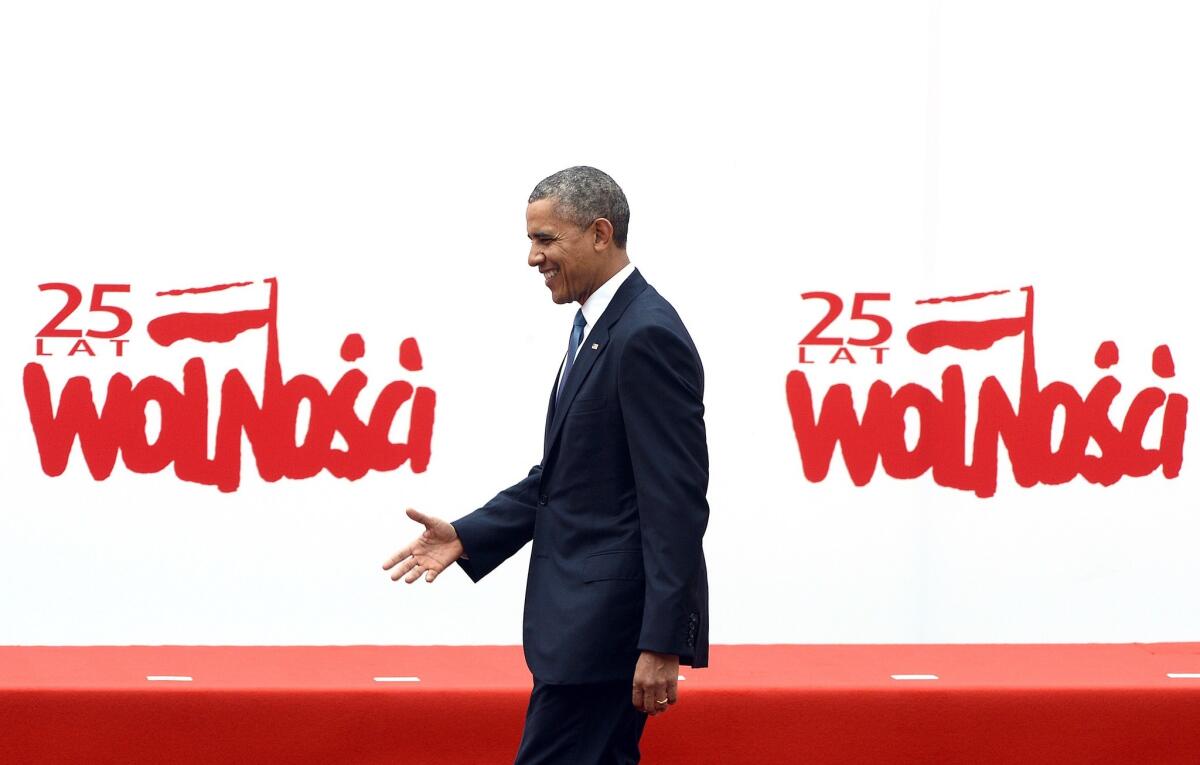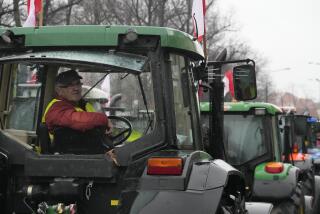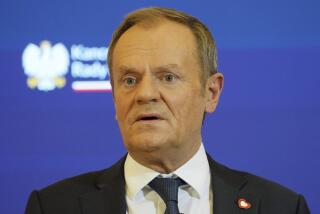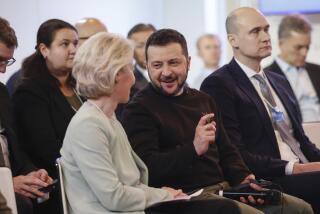Obama holds up Poland as model for Ukraine

President Obama held up post-communist Poland on Wednesday as a model for its struggling neighbor Ukraine as he warned of “dark tactics” from Russia and vowed to defend a region long trampled by foreign forces.
“Here we see the strength of free nations that stand united,” Obama told thousands of people gathered in Warsaw to celebrate the anniversary of elections that led to the end of communist rule 25 years ago.
“This land was invaded and conquered, carved up and occupied,” he said. “But those days are over. Poland understands as few other nations do that every nation must be free to chart its own course, to forge its own partnerships, to choose its own allies.”
Obama declared Ukrainians the “heirs of Solidarity” — a tribute to the movement that led the push for Poland’s political transformation. Like the Poles, the Ukrainians are fighting for self-determination, he said.
“Beaten and bloodied, they refused to yield,” he said of the Ukrainians. “Threatened and harassed, they lined up to vote. They elected a new president in a free election — because a leader’s legitimacy can only come from the consent of the people.”
Obama’s remarks came shortly after his first formal meeting with Ukrainian President-elect Petro Poroshenko, the chocolate magnate and politician who won last week’s balloting. After the 70-minute meeting, Obama announced that he had approved a package of $5 million in nonlethal aid for Ukrainian defense forces to be used for body armor, night-vision goggles and communications equipment.
Ukrainian officials have been open about their requests for more U.S. military help as they battle pro-Russia separatists in the eastern part of the country. U.S. officials suggested Wednesday that such support was on the table for discussion. Deputy national security advisor Ben Rhodes said Obama told Poroshenko that he was “very open” to the possibility.
But such aid would probably be tied to long-term reforms in a country that has been plagued by corruption and weak institutions. Poroshenko and Obama discussed plans for such reforms, as well as easing Ukraine’s dependence on Russian energy and efforts to decentralize its federal control to accommodate calls for more autonomy in the east.
The White House believes those plans provide “a basis for the reduction of tensions,” yet Obama put the onus on Russia to shift the course of the conflict. Western officials accuse Moscow of backing separatist groups and are calling on the Kremlin to use its sway with the militias to end the fighting.
“The days of empire and spheres of influence are over,” Obama said, standing behind protective glass at the ceremony in Castle Square, where Solidarity protesters once gathered. “Bigger nations must not be allowed to bully the small, or impose their will at the barrel of a gun or with masked men taking over buildings.”
The speech was Obama’s second recent attempt to frame the conflict in Ukraine in terms of history and of his own foreign policy agenda. In March, the president warned against casting the dispute as a return to Cold War. On Wednesday, he seemed more comfortable embracing some of the hard-line rhetoric of the era.
“Our free nations will stand united so that further Russian provocations will only mean more isolation and costs for Russia,” he said. “Because after investing so much blood and treasure to bring Europe together, how can we allow the dark tactics of the 20th century to define this new century?”
Affirming the NATO treaty, he declared that “an attack on one is an attack on all.”
“As allies, we have a solemn duty — a binding treaty obligation — to defend your territorial integrity,” Obama said. “And we will.”
One analyst compared the address to the rhetoric of Obama’s predecessor, whose foreign policy approach Obama has repeatedly denounced.
“This was a strong and powerful speech about the vital importance for countries to be able to choose their political, economic and security future and not have other, larger nations dictate their future to them,” said Heather Conley, director of the Europe program at the Washington-based Center for Strategic and International Studies.
“As much as the Obama administration has shied away from anything that smacks of President Bush’s ‘freedom agenda,’ this speech was as close to an Obama ‘freedom of choice’ agenda that I have read,” she said.
Still, while Obama’s speech included soaring promises, he has no clear way to fulfill many of them.
He declared that he would not accept Russia’s annexation of Crimea in March, but his administration essentially has done so, at least for now. The U.S. has focused its efforts not on persuading Moscow to return the peninsula to Ukraine but on trying to prevent additional incursions and quiet the upheaval in the east.
After the remarks, Obama flew to Brussels for a meeting with the Group of 7 economic powers to discuss next steps on Ukraine. The group has sought to isolate Russian President Vladimir Putin, but there have been signs that the strategy is somewhat adrift.
Several Western leaders plan to meet with Putin later in the week in France as they gather to celebrate the 70th anniversary of the Allied landing at Normandy. Meanwhile, the push to impose additional sanctions on Russian businesses appears to have lost some steam amid resistance from key sectors.
The White House said Obama had no plans for a formal meeting with Putin. Rhodes said the Group of 7 leaders would spend the meeting in Brussels discussing how to speak with “one voice.”
More to Read
Start your day right
Sign up for Essential California for news, features and recommendations from the L.A. Times and beyond in your inbox six days a week.
You may occasionally receive promotional content from the Los Angeles Times.







